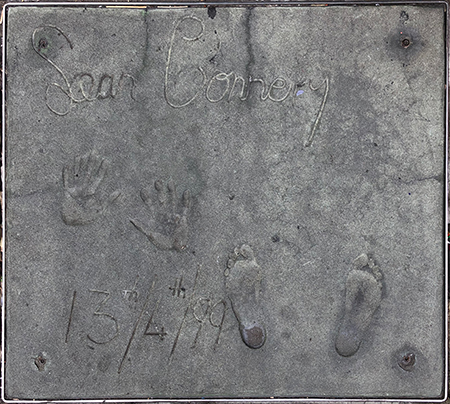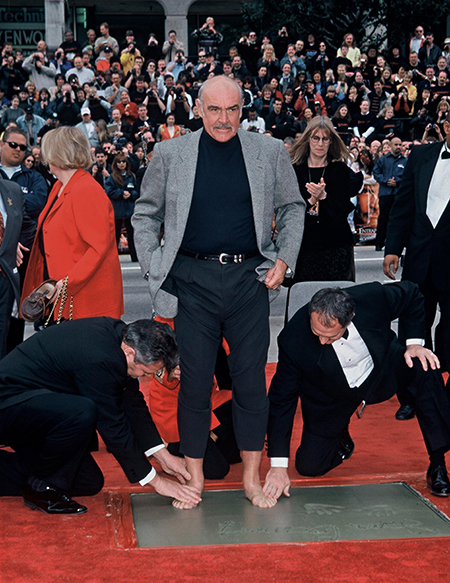 |
 |
|
|
| Sean Connery |
 |
| Forecourt Ceremony held on Tuesday, April 13, 1999 |
| |
Born: Thomas Sean Connery, August 25, 1930, in Fountainbridge, Edinburgh, Scotland
Age at the time of the ceremony: 68
Died: October 31, 2020 in Nassau, Bahamas, age 90
|
| |
Sean Connery was the very definition of movie star. Equally liked by both men and women, the tall, strapping actor wowed the world with his James Bond films, then broke free from their grip by making a string of portrayals in films for a whole range of directors.
Born to working-class parents of Irish/Scottish decent, he was usually called "Tommy" at home, but also used "Sean." As a lad, Sean drove a milkwagon around Edinburgh. Joining the Royal Navy, he was drummed out for having a duodenal ulcer. Connery worked a series of odd jobs: lorry driver, artist's model, coffin polisher. . .
By the age of 18, Connery began weight training, while becoming a fair soccer player. He was offered a spot on a local professional team; but Sean decided to follow acting instead, having fallen in love with The King's Theatre. He got a part in the chorus of South Pacific and stayed with it, working his way up to play Buzz Adams.
Big enough and tough enough to fight off attacks from local gangs, Connery began to take elocution lessons in London. Roles on the stage soon followed, along with an assortment of projects. In 1954, at the age of 24, Connery played a bobby in the short film Simon, but the film was never released. He had a small guest role on the long-running cop show
Dixon of Dock Green starring Jack Warner, aired over the BBC in June 1956. He played an minor Arab character in Sailor of Fortune starring Lorne Greene, aired in syndication worldwide in 1956, and was first seen stateside playing a Italian porter with a Scottish brogue in a bit in an episode of The Jack Benny Program aired over in January 1957.
Hiring a new agent got the wheel rolling;
he had a minor role in the crime potboiler No Road Back (released in February 1957) starring Skip Homiere, as well as in the trucker / rackets film Hell Drivers (released in July 1957) with Herbert Lom. He also starred in an episode of Armchair Theatre called "The Boy with the Meat Axe" aired over ITV in November 1958.
Connery had fun appearing with Lana Turner in Another Time, Another Place (released in May 1958); he had to punch out a suspicious Johnny Stompanato. Turning toward Walt Disney, Connery got his first big role playing the Dubliner Michael MacBride in Darby O'Gill and the Little People (which played the Chinese in June 1959) with Albert Sharpe.
Returning to television, Connery
played a version of Hotspur in An Age of Kings aired over the BBC in 1960, played Macbeth in a television version aired over the CBC in January 1961, and played Vronsky in a television version of Anna Karenina with Clare Bloom in the title role, aired over the BBC in November 1961. Playing a private, he joined the ensemble cast of The Longest Day (released in October 1962).
Author Ian Flemming didn't think Connery looked like James Bond, but every woman he knew told him of Connery's sex appeal. When he was cast as James Bond in Dr. No (released in October 1962) with Ursula Andress, Fleming was so impressed with Connery, that the Bond novels began to mold Bond to more resemble Connery. Dr. No became very popular, being followed up with From Russia with Love (released in October 1963) with Robert Shaw. After this, Connery did a picture for Alfred Hitchcock: Marnie (released in November 1964) where he got second blling under "Tippi" Hedren.
Goldfinger (which played the Chinese in December 1964), brought the James Bond franchise to a whole new level — bigger production values, bigger everything — it was a worldwide smash hit, causing Connery to crank out the next installment in only 12 months: Thunderball (which played the Chinese in December 1965) with Claudine Auger, became a bigger hit than Goldfinger.
Attempting to find other things to do besides James Bond, Connery did the character study comedy
A Fine Madness (released in June 1966) with Joanne Woodward. The following year, he directed a documentary on labour relations within the Scottish shipbuilding industry The Bowler and the Bunnet (released in July 1967).
Returning to James Bond,
You Only Live Twice (which played the Chinese in June 1967) with Akiko Wakabayashi, took Connery to Japan, then he went to Italy to play a crew member of an ill-fated Arctic expedition in The Red Tent (released in December 1969) with Peter Finch, then went to eastern Pennsylvania for Martin Ritt's film of a coal mining strike
in
The Molly Maguires (released in May 1970) with Richard Harris. Working with director Sidney Lumet on The Anderson Tapes (released in June 1971) with Dyan Cannon was a mixed bag.
Not really wanting to play Bond once more, Connery asked for — and got — $1.25 million to do the next one. He used the money to establish a fund for Scottish artists. Diamonds Are Forever (which played the Chinese in December 1971) with Jill St. John, grossed almost as much money as the other Bond films.
Connery strode out to work his way away from Bond. With director John Boorman in
Zardoz (released in February 1974) with Charlotte Rampling, Sidney Lumet again for Murder on the Orient Express (released in November 1974). He played Mulai Ahmed er Raisuli in the thumping adventure film The Wind and the Lion (released in June 1975) with Candice Bergen.
A non-Bond masterpeice of Connery's has to be
The Man Who Would Be King (released in December 1975) with his good friend Michael Caine. He played Robin Hood in Robin and Marion (released in March 1976) with Audrey Hepburn, and appeared in the ensemble film A Bridge Too Far (released in June 1977). Connery starred in Michael Crichton's fanciful
The Great Train Robbery (released in February 1979) with Donald Sutherland.
He returned to science fiction with
Outland (which played the Chinese in May 1981) with Peter Boyle, then joined the Monty Python group for Time Bandits (released in November 1981) with John Cleese. His final, final, final film as Bond became Never Say Never Again (which played the Chinese in October 1983) with Kim Basinger; during filming, Connery had his wrist accidentally broken by fight coordinator Steven Seagal. Connery dropped out of films for a few years.
Highlander (released in March 1986) with Christopher Lambert, brought Connery back, and The Name of the Rose (released in September 1986) with F. Murray Abraham, was a success. Connery bagged the Oscar for supporting actor with The Untouchables (released in June 1987) with Kevin Costner. Playing Harrison Ford's dad in Indiana Jones and the Last Crusade (which played the Chinese in May 1989) became his biggest hit so far.
Stepping into his role as a Russian submarine commander on almost no notice, Connery was perfect in
The Hunt for Red October (which played the Chinese in March 1990) with Alec Baldwin. He then went to Russia to film The Russia House (released in December 1990) with Michelle Pfeiffer. He played a detective in Rising Sun (released in July 1993) along with Wesley Snipes.
A Good Man in Africa (released in September, 1994) with Colin Friels, was a rare foray into farce; playing King Arthur in First Knight (released in July 1995) was fun, with Richard Gere as Lancelot; the thing fizzled. Connery entered into Michael Bay territory by exectutive producing and starring in The Rock (released in June 1996) with Nicholas Cage.
After playing nothing but extraordinary figures, Connery played Gena Rowland's husband in Playing by Heart (released in January 1999); he produced and starred in Entrapment (released in April 1999) with Catherine Zeta-Jones, which was a roaring hit. Another film Connery produced was Finding Forrester (released in January 2000) with Rob Brown.
Connery also played John Muir in an episode of Freedom: A History of Us aired over PBS in February, 2003.
Before retiring from the screen, Connery was executive produer and headlined as Allan Quatermain in The League of Extraoridinary Gentlemen (released in July 2003). Retired from showbiz since then, Connery spent the rest of his life in the capital city of Nassau in the Bahamas, where he died in his sleep at the age of 90. |
|
|
|
|
| |
 |
 |
| Mann's Chinese Theatre, Hollywood, California. Sean Connery Forecourt block. Executed by unknown, Tuesday, April 13, 1999. 43 x 44 inches. |
 |
 |
 |
| Mann's Chinese Theatre, Hollywood, California. Sean Connery Forecourt ceremony, Tuesday, April 13, 1999. Sean Connery stands tall as his bare feet are impressed into the wet cement. |
|
|